Contact Us : 800.874.5346 International: +1 352.375.0772
The best CPA review courses provide everything you need to pass the CPA Exam, including a large bank of practice questions with thorough answer explanations, an experience that mirrors the real exam, and support for your study journey. The best CPA review courses also consider your learning style.
Table of Contents
The best CPA review courses
Comparison of top CPA review courses
How to choose the best CPA Exam review course for you
CPA review books
Live CPA review classes vs. self-study
Online CPA review courses
CPA audio and video review
CPA review flashcards
CPA review programs with the best coverage
CPA review course reviews
How to get free CPA review materials
Best way to prepare for the CPA exam
Choosing the best CPA review course begins with knowing how to decide which is truly the best for you. There are many providers offering a variety of CPA review material packages. Making a decision can be confusing, frustrating, and riddled with unknowns.
Purchasing a CPA review program is also a big financial decision. Be sure you pick the best review course the first time, so you can pass on the first try. Here are all the facts and guidelines you’ll want to know. We cover must-have features; provide detailed guidelines for getting the right course for you; include a side-by-side, feature-by-feature comparison chart; discuss learning styles; and more.
Financing
It’s important to find a CPA review program at a price that fits your financial reality, but a lot of courses can be pretty expensive. Luckily, a great CPA review course will offer reasonable financing so cost doesn’t necessarily stop you from getting the review you need.
A great example is financing through . This option puts you in control because you can select the loan that works best with your budget. This process is fast and simple:
. This option puts you in control because you can select the loan that works best with your budget. This process is fast and simple:
With  financing, you can pay over time for one of the most important purchases you will ever make.
financing, you can pay over time for one of the most important purchases you will ever make.
Knowing your learning style and choosing a review course that best suits it can make an incredible difference when it comes time to study, as well as when you sit for the CPA exam. If you know your learning style, you probably already know how you like to study and that will surely influence your review program preferences—simply align your learning and studying style with the features and services offered by CPA review courses.
If you don’t know your learning style, take some time to answer these questions. They’ll help you determine what your style is and what kind of self-study course you should look for:
What type of learner are you?
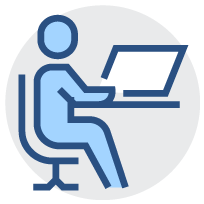
Solitary Learner
Best method: self-study CPA courses
If being with others is not essential to your learning process, you’re probably a solitary learner. Solitary learners can depend on a self-study CPA course to pass the exam. There are lots of options that enable you to study on your own time in the comfort of your home (or whichever CPA Exam study environment you prefer). These courses feature resources to account for all learning styles; some even include access that lasts until you pass. If you like to study on your own but need some guidance on where to focus your efforts, an adaptive CPA review course is what you need.
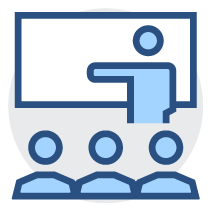
Social Learner
Best method: live CPA review courses
The CPA is a certification, not a degree, but you can still prepare for the CPA Exam in a classroom environment if you’re a social learner. The best CPA review course for social learners may be a live course in which a teacher and fellow students serve as some of your primary learning resources. Whether presented online or in a classroom, live lectures are similar to college courses: you show up at a designated time, attend with other CPA candidates, and receive instruction from a professor. One course usually covers one CPA Exam section and can last for a few days or a whole month, with individual sessions extending for several hours. If you feel that learning with others is worth your time, you should consider a live CPA review course.
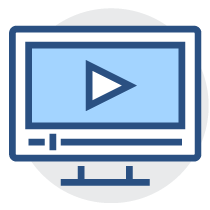
Visual Learner
Best method: books and video lectures
If you’re a visual learner, you’ll need a review course that provides information to look at and watch. Some review courses contain books full of illustrated examples and dozens of explanatory videos. If videos are critical to your learning process, choose a review course with plenty of them. Several review courses feature extensive libraries of video CPA lectures.

Auditory Learner
Best method: CPA audio review
If you’re an auditory learner, seek out a review provider that offers CPA audio review lectures. Audio reviews can take longer to get through than books, but you can make the most of your time by listening to them while you travel, clean, exercise, etc. To get even more access to exam content shared via sound, you’ll want to consider a provider that offers audio lectures.
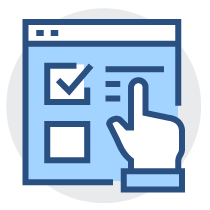
Kinesthetic Learner
Best method: online CPA review course with physical books and flashcards
If you’re a kinesthetic learner, you’ll benefit from online CPA review courses because computer-based study reinforces what you’re learning with the sense of touch and imitates the exam environment. Flipping through flashcards further connects the exam content to feeling and moving. You’ll also benefit from a physical book you can hold and flip through, so choose a provider that includes printed books.

Linguistic Learner
Best method: physical books
As a linguistic learner, you’ll want a CPA review course that provides physical books so you can interact better with the words. When you read digital books, your learning experience is limited by factors such as:
These learning limitations leave your mind with minor memory handicaps. Consequently, remembering information takes longer with digital books than with physical books, so for the love of words, seek a physical-book-providing course if you’re a linguistic learner.
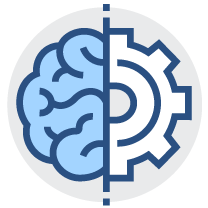
Logical Learner
Best method: outlines of CPA exam content
CPA candidates who rely on logic to understand new concepts will benefit from a review course that spells out exam topics in a systematic way, such as content outlines. Content outlines build new accounting information on top of the old in bulleted lines rather than packing everything into chunky paragraphs. Along with logical outlines, you’ll also want a course offering detailed answer explanations for every practice quiz question. These essential explanations help you understand the “why” behind every correct answer.
Once you know your learning style, evaluate each review course to ensure it will meet your learning needs. No matter which type of learner you are, there is a CPA review course that will work for you. A great way to determine if a CPA review program satisfies your learning style before you buy it is by trying a course demo.
Most review providers offer a free demo with varied access periods. Some limit your time to explore the demo to a few days or weeks, but others give you several months or even unlimited access.
A demo should give you a good idea of what features you’re getting, which features will benefit you, which you prefer, and which you may not need. Below is a breakdown of the benefits of common CPA review course features, with some helpful information to know if you have just begun researching courses, or if you haven’t yet registered for a demo.
Books present information effectively. Almost anyone can learn from a book, as books address five major learning styles:

Solitary

Visual

Kinesthetic

Linguistic

Logical
Digital books
Physical books
Differences among CPA review books
Like all CPA review course features, CPA review books are not created equally. Some are exhaustive in length, some skimp on pages and information, but the best CPA review course achieves the perfect balance—thorough content coverage presented in manageable portions.
Review books that cut corners with content don’t adequately develop your knowledge, and books that fail to consider efficient formatting leave you feeling overwhelmed or entirely burnt out. Ideally, your review book should cover all of the CPA Exam content without exhausting you. That’s where tiered content outlines come in.
Benefits of tiered outlines
Tiered outlines contain bite-sized lessons about each exam topic that you can digest easily and steadily. When your CPA review book has quality content outlines, you don’t have to worry about missing any information. Instead, you can concentrate on achieving deep comprehension.
The AICPA’s CPA Exam Blueprints
These blueprints detail tasks representing the responsibilities of real CPAs and assign a skill level to each task. The higher levels of skill require answering the “so what” questions: you must explain why something is important or unimportant. You can only reach those skill levels if your CPA review books include comprehensive and easy-to-grasp content coverage and hundreds of high-quality practice questions. Your book should contain a significant number of challenging MCQs. If the amount or difficulty levels of the questions are lacking, you need to find another course provider. Furthermore, your book shouldn’t include task-based simulations (TBSs) or written communication tasks (WCs) because a book can’t replicate the process of answering these questions. You’ll get better acquainted with the exam environment if you answer those types of questions in your online course. However, you can still use the information in your books to reach the skill levels at which the TBSs and WCs will test you.
A live CPA review course demands a structured schedule and regular interaction with people, but self-study materials provide a multitude of tools to use at your own pace. CPA self-study materials do require some self-motivation, but the benefits show that they may be the best choice for you. Why? Because self-study materials are…
Efficient
CPA self-study materials sync up with your agenda, so you can study on your own time and work around your unique lifestyle.
With live review courses, completion of the material depends on the class schedule. This timeline may move too fast or not fast enough for you. If you’re not able to finish the homework in time, you’ll fall behind. If you find yourself flying through the material, then the class will just waste your time. Whether the class is online or in your area, review providers usually only offer one class at time, so you must take the exam sections in the order in which the review providers offer the live courses.
The set schedule of a live class also doesn’t account for unexpected life interruptions. If your lifestyle is adjustable enough to accommodate every session, you’re in luck, but if something comes up, you’ll miss out on that time to learn and lose the money you paid for it.
With self-study CPA review materials, however, you can plan your study sessions during the times when you are most mentally and physically ready for them; you don’t have to force yourself to be awake and alert when class begins. Finally, you don’t have to let the lineup of the classes determine the order in which you take the exam sections. This freedom enables you to organize your exam sections in the way that works best for you.
Economical
CPA self-study materials provide everything you need to prepare for the CPA Exam without breaking the bank.
To account for expenses such as the classroom space and the professor’s time, live review courses can be fairly costly. Some cost over $1,000 per part, so when you purchase live courses for four exam sections, you end up paying almost three times as much as the price of an online CPA review course covering four sections—not to mention any supplemental study tools that will cost you another couple hundred dollars.
When your online CPA review course includes assistance from exam mentors and accounting experts, it’s just like getting the help of a professor at no extra charge. The added bonus of an Access Until You Pass® guarantee ensures that you make the most of your investment by preserving and updating your CPA self-study materials for as long as you’re studying.
Flexible
CPA self-study materials include a variety of resources to meet your learning needs.
With a live review course, you get the instructor you get, no matter what his or her teaching style may be. If you find that your professor doesn’t share a lot of additional explanation or insight, you’ll have to depend on yourself to fill in those gaps anyway.
Along with help from exam mentors and accounting experts, CPA self-study materials can include books, video lectures, audio reviews, and CPA test questions. You can turn to any of these study aids whenever you need to answer your questions, clarify any confusion, and increase your comprehension of the content.
Still considering a live CPA review course to help you on your way to becoming a certified public accountant? Live CPA review classes are becoming less and less available with the proliferation of online CPA courses. Today’s generations want more control over where and when they study. That said, studying alone can be isolating. It’s downright hard at times when you go through a tough patch. If you’re looking for a live CPA review course, consider other options that might fill your need. Are you wanting to connect with others who are also studying? You could reach out in an online forum to see if there are others in your area. Do you have questions about accounting material? Perhaps a local class at a university could help. Developing a relationship with a CPA mentor can be rewarding in many ways, too.
All of the best CPA review courses include an online component. In fact, the offline books and live CPA review classes usually supplement the online courses. Online CPA review courses now offer more benefits than ever before.
Focused
When you use an online CPA course with adaptive technology, your review revolves around you, so you can learn, improve, and excel at your own pace.
A live review course follows a strict format for your CPA review, which doesn’t get personalized to your unique strengths and weaknesses. Live CPA review classes will plug along as planned, whether or not you can keep up. In fact, some attendees of live classes have reported that the classes rely heavily on the same video material available online. The main benefit seems to be the presence of an instructor you can interact with.
If you find that you need to concentrate on different areas of exam content for varied periods of time, then CPA self-study materials can meet your needs – especially with an online CPA review course that includes adaptive technology. A truly adaptive CPA review assesses your knowledge to determine your strengths and weaknesses before it generates a customized study plan just for you. As you work through the study plan, an adaptive course lets you apply what you’ve learned to practice questions.
A truly adaptive online CPA review course then continues to serve you questions on your troublesome topics to ensure mastery. The final review of an adaptive CPA course goes one step further than a live review course by using your practice exam results to advance your proficiency with all content areas.
See a feature-by-feature comparison of adaptive CPA review courses.
Realistic practice tests
The ability to practice in a realistic testing environment sets online CPA self-study materials apart.
A live review course and books can help you become familiar with the content of the CPA Exam, but they can’t help you become as familiar with how the exam looks and feels.
When you answer practice questions that look just like those on the actual exam, and you practice with a platform just like the one you’ll use on testing day, you can reduce or eliminate the number of surprises you face when you take the real exam. Familiarizing yourself with the testing process prepares you for every part of the CPA Exam.
The best CPA review course will come complete with high-quality video and audio lectures that are just as effective at teaching you the course materials as a traditional textbook. Some of the benefits are immediately obvious:
Video lectures
The best CPA review courses create video lectures featuring passionate, professional educators and industry experts who dedicate hours in the video studio preparing the lectures they’ve found most effective for their own students. The best videos include in-depth coverage of topics and walkthroughs of some of the most difficult exam questions.
Audio Lectures
Streaming and MP3 audio lectures are also available from quality CPA review courses. These accommodate nontraditional study time, especially when on the go (commuting, traveling, exercising, etc). CPA audio review lectures can be extremely helpful for learners who either benefit most from hearing information or benefit from highly portable knowledge transfer systems.
Are flashcards necessary? They can be great for drilling facts into your memory—but only a small portion of the CPA Exam relies on memorization. Many CPA Exam review providers now offer flashcards in online apps, though it’s debatable how much benefit this actually provides during your exam study. You’re better off practicing application of material and making your own flashcards for those facts you’ve found you need extra help remembering. Making your own flashcards can be effective, because the act of writing down material helps you to remember it. To get the most out of your CPA review flashcards, apply these best practices.
Be neat
When creating CPA flashcards, make sure they are written neatly and consistently in your best handwriting. You want to be able to glance at the cards and read them without any difficulty.
Limit information
Don’t put too much information on one card. Long cards take more time to comprehend, making them ineffective as “flash” cards. Therefore, word your cards so that either side can be a starting point for studying. If you must have a longer answer, help yourself by highlighting the key terms.
Add pictures
Include pictures or graphs on your cards whenever you can. Associating an image to a word is easier for your brain than associating a word to another word or phrase.
Don’t repeat
Only use a particular term or answer once per set of cards. Trying to memorize multiple associations in one set is counterproductive, as you won’t be able to know which card matches which answer.
Stay organized
Organize cards by category. Assign each category a number and put that number in a bottom corner of the card. The cards will then be easier to re-sort later. With Gleim CPA Review, you can organize your flashcards by study unit.
Limit the set size
Limit yourself to only making 50 to 70 CPA flashcards per set. Working with larger groups makes it difficult to retain the information and go through the cards in one sitting.
Standardize memorization
Only consider cards memorized when you can answer them in the morning after a full night of sleep. If you go through your flashcards three times a day and only know the answer to a card on the third try, then there is a good chance that you will have forgotten it by morning.
The CPA Exam can undergo big changes unexpectedly, leaving you little time to adjust your plans and strategies. Even small changes occur pretty frequently, such as when the AICPA makes revisions to the CPA Exam Blueprints.
When choosing the best CPA review program, you’ll want to be sure that the provider has created a course that is comprehensive and up-to-date.
The best providers use the AICPA’s Blueprints, released questions from old CPA exams, and candidate feedback to create their study materials. In addition, they closely monitor overall pass rates against their own candidates’ pass rates to make sure that their material is actually working.
Multiple-choice questions (MCQs)
Multiple-choice questions (MCQs) account for 50% of the CPA exam, and as such, they are one of two question types you will need to practice, practice, practice. Obviously, the best CPA review program will supply you with:
Task-based simulations (TBSs or “SIMs”)
The other 50% of the exam is made up of task-based simulations (TBSs). In the past, this type of question did not make up as large a portion of the exam, but as the exam is revised, TBSs are assigned more and more importance. Therefore the best CPA review course will provide you with:
You’ve probably already started looking at the various reviews of CPA review courses. It can be really helpful to see what others who’ve gone before you say about their experience with different review providers. A word of caution, though. You will come across reviews that at first glance appear to be thorough and unbiased, when in fact they are promoting certain courses according to how much money they can earn affiliates. As you explore CPA review course reviews, look at several sources and consider consistency. You can see our course reviews for Gleim vs. Surgent, and Gleim vs. UWorld Roger CPA. We also recommend you talk to colleagues, professors, and other advisers directly to see what they think. See also course reviews of Gleim.
The best CPA review courses offer many free resources to help candidates who want to know more about the CPA Exam prior to purchasing a full review course and starting to study for the exam. The items below are examples of free, helpful resources on your path to passing the CPA Exam.
Use these links to explore free CPA exam resources:
NOTE: These free resources are not a substitute for CPA exam prep. You should still find the right CPA review course for you so that you have everything you need to pass. However, you can use these free CPA review materials to learn more about the exam and inform your CPA review course decision.
Free CPA review courses for students
If you are a student, you may be able to get an entire CPA Exam study course for free.
Check to see whether your provider has a student brand ambassador program. Not only can participation earn you a full, free review course*, it’s also a fantastic resume and personal skills building opportunity.
*This is a reward offered by the Gleim Campus Rep program. Brand ambassadorship rewards and offers will vary by review course provider.
Sufficient preparation for the CPA Exam requires ample practice with the exam content. You study for the CPA Exam to be prepared for anything the exam may throw at you—from internal control concepts for the Auditing section to S Corporation tax structures in Regulation. Your CPA review course should cover every testable topic. If you study with a course that decides to exclude some exam content, you’ll go into the exam with too many weak areas. So to help you be familiar with the accounting information specified in the CPA Exam blueprints, choose a course that covers all of it.
Comfort and confidence
Being comfortable on exam day encompasses an entire array of tactics from how you dress to how much you know about the CPA Exam structure, layout, functionality, and timing. To determine your exam day wardrobe, diet, travel schedule, stress management strategies and more, check out this guide to conquering the CPA exam and studying stress-free. As for testing, the best CPA review course should provide you with simple, effective, and reliable approaches that help you pass.
A course that’s been carefully and intentionally designed to replicate the CPA Exam as realistically as possible should make you feel right at home with the real exam before you even sit. Practicing with a course that simulates the real testing environment allows you to see what each screen will look like (e.g., introductions, directions, multiple-choice questions, Task-Based Simulations, etc.) and learn how each screen functions (e.g., where to click to exit a testlet, how to navigate to the next question, etc). You’ll then have hands-on experience with the process of taking the actual test.
Not all CPA Exam review courses accurately mimic the real CPA Exam. In fact, this is a common claim many providers make without following through on the promise. Additionally, these courses contain many different varieties and amounts of questions. For instance, one course may offer 10,000 practice problems, including real questions released by the AICPA, all of which are exam-quality. Another course may offer 12,000 questions, but those may not accurately represent the questions you’ll see on the exam, and they may also not include answer explanations, a critical component which helps you learn the material.
On exam day, being comfortable and confident means less distraction and fewer surprises, enabling you to concentrate more on the knowledge you’ve gained and less on the mechanics of manipulating the screens. The test is timed, so you’ll be able to move efficiently through the exam with some practice.
When you know what to expect of the CPA Exam in all these areas, you’re sure to do better on the test. Fewer surprises means less anxiety, and less anxiety means better performance.